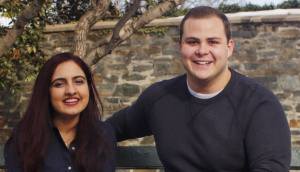The Voice sat down for its second interview of the 2016 GUSA executive election season with Enushe Khan (MSB’17) and Chris Fisk (COL ‘17). In the interview, they discuss how they plan on “Breaking Barriers, Building Bridges” to promote inclusivity in GUSA and on the Hilltop.
This interview has been edited and condensed for clarity.
The Voice: Your campaign motto is “Breaking Barriers, Building Bridges.” What does that mean and how does it tie in with your platform?
Enushe Khan: This is our third year here at Georgetown and we’ve both been involved with GUSA in some capacity since our freshman year, and a big thing that we felt within GUSA was that as a representative body, we saw it as sort of insular and exclusive and somewhat away from a lot of the different communities on our campus that have this certain distrust, so we’ve seen that that barrier has yet to be broken. That’s one big part of it. How can we bring people together?
Chris Fisk: GUSA has been characterized as exclusive, nebulous, inefficient, all those things, and I think that one of the most important things is inclusivity, and that’s why we decided to again restructure, in terms of our campaign, having as many people collaborating as possible to come up with platform points around certain issues and just kind of setting the tone. Anyone and everyone should be contributing to what they’re passionate about, and it shouldn’t be exclusive just to a certain few.
TV: Your platform touches on a wide variety of issues. What issue do you think is the most pressing for Georgetown students and how do you plan on addressing it?
EK: Right now, just where we are timeline-wise, obviously the campus plan. I’m on the consortium so I’ve been in this conversation. The first draft will be completed by April and the final draft the university wants to sign in May so depending on how the timeline looks, it’ll be signed in May or will spill over a couple weeks or what not, months, who knows. But most likely, I know they’re really pushing on signing in May because it’s obviously MedStar’s money on the line as well. That’s pressing because the big number one push that I think students really want in terms of the next campus plan is no new construction projects on campus until you’ve fixed and renovated existing living buildings. Henle should no longer have cold water before you build a new housing project. That’s a given, and that’s a big push that we need to see. We as students got screwed over on the last campus plan, and we have to live with the ramifications of that, but with that being said, we need to use this next campus plan as an opportunity to sort of resalvage whatever we can and to really push for student demands and interests so that’s one.
Other than that, dining, just in terms of where we are timeline-wise … with the new [Request for Proposal], the contract re-negotiations. I sit on that RFP working group with different administrators and consultants, and we’re going to be picking a new vendor since the Aramark contract will be expiring, and the new contract will be in effect 2017 summer so we’re going through that process, and we’ll have RFP done by March 3. Then beyond that, we really have to make sure that we get the different, specific contract that we want so student input is really important.
CF: And adding to that, I think that another one of our priorities is socio-economic inclusivity as well. I think that there are concrete ways that universities can be assisting to level the playing field socio-economically for students on campus, and I think that GUSA has taken a back seat in that role but can be a stronger advocate on those issues and can be helping existing resources like GSP, CMEA, CSE, and stuff like that to kind of push those issues to the forefront.
TV: You’ve talked a little bit about why you decided to run, and I want to ask you another question about that. There was a recent article in The Hoya. They recently ran a piece about how you, Enushe, will not be on campus for the summer. In it, multiple people have described the situation as less than ideal, so why are you deciding to run for GUSA if you can’t commit fully to it while other people can?
EK: I got this offer last week on Friday. Initially, when I had first applied, it was because I was entering this as recognizing that this could be a competitive election and I needed some backup … It’s ten weeks. It’s not the full summer. Just to clarify, it would be from June 2nd to August 11th … [Former GUSA President] Trevor Tezel, when I first spoke with him, the first thing he said is “Take it. It’s totally doable.” … We have a very specific plan, and beyond that, also, how we’re approaching our administration is very different from past. GUSA is not one person, and we see this as a partnership, and we see our team as fully capable, and we recognize that we are trying to go beyond just this exclusive body with one face to administrators and students … a big part of why I decided it would be fine if I took it was one we would have seven people, already on our core staff who would really like to get involved over the summer and would like to get involved with the executive … We do have relationships with the administration already in place. So it’s just a matter of Chris would be attending those meetings face time, really engaging with those administrators. Chris and I are planning to speak on a nightly basis to touch base. I’d be coming down here every Saturday to take important meetings that the president would be required to be at; i.e. GCP master planning working group meetings, committee meetings … I think it’s also important to recognize that we have students who really want to step up and we should be able to empower them to do that.
CF: The only thing I want to add there is GUSA is not one person. GUSA is a team. GUSA is also a partnership between both of us, and it is, in my opinion, flawed to think that because that one person will be gone for ten weeks that the rest of the team is not capable of doing the job. So I consider myself to be very relevant to this conversation because I would be that person, and to imply that her not being here, that I’m here, that I’m less than capable of doing that job is not necessarily correct.
TV: How did you two come to the decision that Enushe would be President and Chris would be Vice President?
CF: We shared the fact that we had the same vision for this thing. And then we talked about the fact that if one of us cared about the title “president” versus “vice president,” we probably weren’t doing it for the right reasons anyway … Basically we sat with a group of our campaign staff, we flipped a coin. We decided we both didn’t care about the title. We cared about working together and jointly being a partnership to represent the student body.
TV: Can you tell us a little bit about your budget? What’s on it? What are the basics? Anything new? Anything big?
EK: So GUSA fund – we definitely want to increase the amount of funding that we have allocated to it so we proposed around $25,000, which is a big number because we believe that especially with non-access-to-benefits groups, the opportunity to somewhat gain funding or co-sponsorship is huge. Also … with our new structure, a lot of would be sort of shared within the Executive, within the Senate. We’re also going to be focusing on outreach and communications so we have a budget allocated to that as well … we’re going to have that shared budget because typically, what that is used for is outreach events, which doesn’t really matter if it’s Senate or Executive at that, and it should be both. We’ve had pancake breakfasts and what not this semester so that’s important that the student body has the ability to engage with their representatives and ask questions so that’s something that will be there.
TV: Which group, organization, or administrator do you anticipate will be the hardest to work with?
EK: If we’re talking about group, definitely our neighbors because we’re approaching that campus plan negotiation phase and it’s tough because their interests are very different from ours. Their interests are to keep [students] off their streets and for us to pay for resources for the neighbors. For example, the reimbursable detail program, the fact that the university is paying for MPD officers to be patrolling the neighborhood when we’re seeing a decline in the number of students that live off-campus. So clearly we have different interests but at the same time, it’s important that in order for us to come to an agreement that benefits students, we be able to work with the neighbors and sort of build that relationship where we can come to common ground and they can begin to see our perspective a little bit better and that they can agree to certain aspects that we want, collaboratively. Again, there’s no benefit at just straight-up going at war. We have to come to common ground because we all just will have to sign the campus plan.
TV: You’re running unopposed. Is that concerning to you? What do you think that says about the state of GUSA?
EK: To our knowledge, Hot Chick and Chicken Madness are running and we view them as serious competitors. I’m very happy that Hot Chick is finally taking a stand and going for it. She’s underrated as a sandwich … In terms of the state of GUSA and Chris talked about this, last year’s election is probably a big reason. It got so toxic. And this is year after year, we see toxic, contentious elections that really just show the nature of GUSA and depict GUSA in a very negative light that students then, that’s how they view GUSA the rest of the year. And last year in particular, things got pretty nasty, and I think that dissuaded a lot of students from wanting to run. It was a concern for me, personally, whether I wanted to potentially go through something like that, put my personal life through something like that, and I think that the fact that is something students have to think about shows just what the nature of GUSA elections are and the problems with GUSA, and that’s a big part of why we decided to run because that needs to change, and we need to institutionally change this organization so that that toxicity is not something that the student body sees when they think of GUSA.
TV: How exactly do you plan on engaging students who don’t really care about GUSA?
CF: First of all, my first point is that to go back to our restructuring, because a lot of times, as GUSA currently exists in the exec, there’s a secretary and an undersecretary and that’s it, and that’s a very exclusive system. So they are deemed the experts on certain issues which in no way, shape, or form is the truth. So I think that restructuring to allow more students who are passionate about certain issues to take part in driving policy is one of the first ways to do it.
And second, from a personal note, I think it’s important that GUSA touches issues like socio-economic inclusivity that it’s never touched before to engage a corner of campus and a side of campus in that conversation as well.
EK: We really need to focus on engaging those groups that have that distrust of GUSA or that view GUSA as this really exclusive body and also the groups that GUSA has traditionally neglected and has not engaged, has failed to engage … Let’s bring the relevant parties to the table. Let’s bring more than just one student to take on that issue because we recognize that in order to get something done on this campus, it takes more than one person.
TV: What do you think has been the most successful thing Joe and Connor have accomplished? What do you think they’ve done that you wouldn’t have done or would have done differently?
EK: I would say the memorandum, the MOU [memorandum of understanding] that they signed with the university on sexual assault. With bystander training, the campus climate survey, that was I think a huge. When they ran, they focused on mental health policy and sexual assault policy, and I think they’ve done very well in those two areas with Project Lighthouse, which I also think was a great accomplishment, and the MOU, which I think is incredibly important.
CF: And in terms of something they could’ve done better, I think that Joe and Connor were so uniquely positioned to engage the student body more, especially as a satire ticket and having been very involved in the Heckler, and I think they had a great opportunity to do that, and I think that fell short. I think they could’ve been much more engaged with the student body.
TV: What, if anything, has campaigning taught you about GUSA and Georgetown and how will that inform your actions as student government leaders?
CF: Campaigning has made evident the apathy that is felt toward GUSA, and I think that it’s a very loud and clear message that we really need to go full speed ahead with our restructuring and re-prioritizing the things that GUSA works and how it works. Because GUSA does a lot. It has the potential to do so much, but with the stigma and this feeling of apathy toward the organization, that’s problematic because then it kind of prohibits GUSA from being an efficient and active advocate on behalf of students on campus.
Editor’s Note: This interview was conducted before the Howard/Maduike ticket declared their candidacy.





